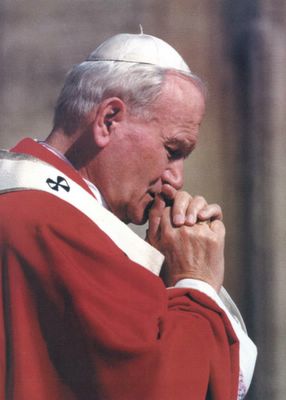
 John Paul II passed away this morning. He will be missed and fondly remembered by me and my family.
I was out walking the dog at a local park when the bells began to ring and ring and ring. I knew, course, what that meant. So did most of the others there, most of whom gave little indication of being Catholic. He was that kind of man. He had a wide appeal, especially to other Christians. They may not have grasped the role of his office, but they liked the man, even if they didn't buy everything he said. I liked him, and I was not in 100% agreement with him. As I have made steps towards understanding his faith, the faith of my native culture, I have had to pause and re-evaluate myself at times. I think I have become a gentler and better person for it. The process continues.
The best commentary I have seen on John Paul and his reign thus far has been in the WSJ:
John Paul II passed away this morning. He will be missed and fondly remembered by me and my family.
I was out walking the dog at a local park when the bells began to ring and ring and ring. I knew, course, what that meant. So did most of the others there, most of whom gave little indication of being Catholic. He was that kind of man. He had a wide appeal, especially to other Christians. They may not have grasped the role of his office, but they liked the man, even if they didn't buy everything he said. I liked him, and I was not in 100% agreement with him. As I have made steps towards understanding his faith, the faith of my native culture, I have had to pause and re-evaluate myself at times. I think I have become a gentler and better person for it. The process continues.
The best commentary I have seen on John Paul and his reign thus far has been in the WSJ:
We had our own disagreements with this pope, notably over America's efforts in Iraq in two wars. But even in disagreement we have always understood that this pope was no schizophrenic. It is possible, as many who otherwise admire him do, to disagree with Pope John Paul's teachings on marriage and homosexuality, on abortion, and so on. But it is impossible to understand him without conceding the coherency of his argument: that the attempt to liberate oneself from one's nature is the road to enslavement, not freedom. In progressive circles in the West, religion in general and Christianity in particular tend to find themselves caricatured as a series of Thou Shalt Nots, particularly when they touch on human sexuality. But it is no coincidence that George Weigel entitled his biography of John Paul "Witness to Hope." For billions of people around the world--non-Catholics included--that's exactly what he was. Perhaps this explains why China, where only a tiny fraction of its people are Catholic, remained to the very end fearful of allowing a visit from this frail, physically suffering man, fearing what he might inspire. We don't expect the secularalists who dominate our intelligentsia ever to understand how a man rooted in orthodox Christianity could ever reconcile himself with modernity, much less establish himself on the vanguard of world history. But many years ago, when the same question was put to France's Cardinal Lustiger by a reporter, he gave the answer. "You're confusing a modern man with an American liberal," the cardinal replied. It was a confusion that Pope John Paul II, may he rest in peace, never made.Lustiger gets right at the heart of the baseless criticism that is levelled at John Paul and the doctrine he defended, expanded, and lived so very well. The criticism that "he is not like us" is not so much serious criticism as it is self worship. ***** William Kristol has this to say of JPII:
he was in fact the first modern pope, and he stands as an astonishing figure: a radical thinker who used the throne of oneof the oldest institutions on earth to try to anchor modernity in truth, liberty, and respect for human dignity.
A particularly striking example is John Paul II's teaching on men and women, sex and marriage. Wojtyla's first book was on the ethics of married life, and it celebrated human sexuality as a gift of God for the sanctification of husband and wife. Decades later, John Paul proposed what Weigel calls "one of the boldest reconfigurations of Catholic theology in centuries," as he addressed the challenges of the sexual revolution and feminism. He argued that the distinct roles of men and women are consistent with their equal dignity, and that marriage, with "the self-giving love of sexual communion," can be the experience "that begins to make God comprehensible to human beings." The pope's argument cuts through the stale debate between liberationists and traditionalists, and makes a distinctive contribution not merely to Catholic thought, but to thought simply. ...
Wojtyla's effort to tie together freedom and truth, and indeed to argue the identity of the true and the good, is a deep and difficult project. It was intended to be, as Weigel says, "accessible to everyone no matter what his or her religious disposition." One has to stop for a moment to recognize just how significant this is. A major player on the world stage and the administrative leader of the world's largest organized religion set himself the profound philosophical task of defending, for believers and non-believers alike, the intelligibility of the world against the radical skepticism and moral relativism of the age.
Comments